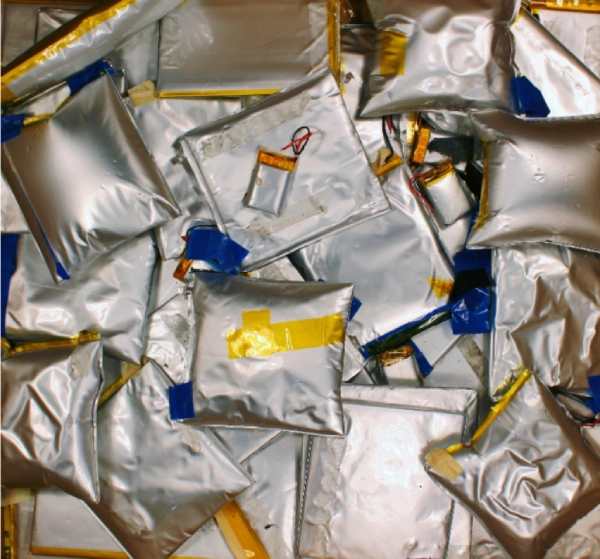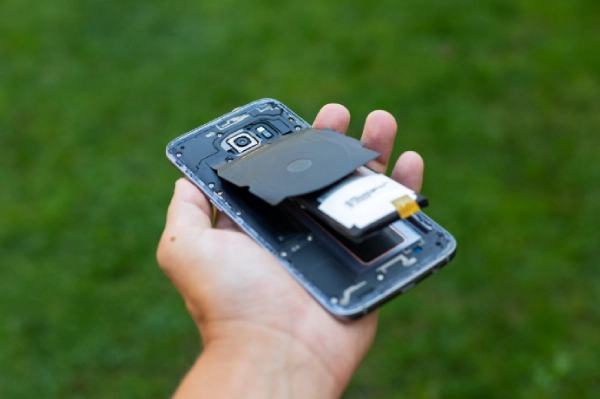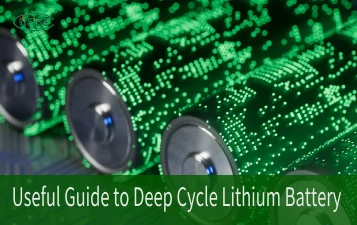Lipo swelling battery, technically known as Li-polymer battery swelling, is a general problem in portable electronic devices. This piece explains the causes, operation principles, and preventive measures taken concerning swollen lithium polymer batteries.
Therefore, there exists a need for one to comprehend the phenomenon of battery swelling due to the increasing use of rechargeable lithium-ion batteries in everyday life applications. In this article, you will also find that a lithium battery explodes.

Part 1. Working Principle of Li-Polymer Battery
The operation principle of polymer lithium batteries or li-polymer or just lithium-polymer is based upon fundamental concepts similar to traditional lithium-ion cells but has a slight deviation in their electrolyte composition.
In contrast to the conventional liquid electrolytes used by lithium-ion batteries, polymer lithium batteries’ electrolytes are solid/gel-like. This polymer electrolyte offers flexibility and a more customizable form factor, making it appropriate for use in slim and light electronic gadgets such as smartphones, tablets, and wearables.
When discharging occurs through the electrolytic solution from the negative electrode (cathode) to the positive electrode (anode), an electric current is generated that powers up the device. On charging, however,, ions migrate back, returning to anode, which can be utilized later.
Part 2. Do Li-ion Batteries Explode?
Lithium-ion batteries are the primary source of worry when it comes to batteries that can explode or cause fire, including those of the polymer type. In some cases, lithium-ion (Li-ion) batteries have been known to explode or catch fire. While such incidences are uncommon, they may occur due to overcharging, physical harm, manufacturing defects, or extreme temperatures.
Overcharging a li-ion battery may lead to excessive heat accumulation that can cause the battery to increase in size and break. Similarly, physical harm like puncture or impact, on the other hand, may weaken the internal mechanisms of a battery, causing short circuits and thermal runaway where energy is released rapidly by the battery as heat.
Moreover, this risk is heightened by material impurities during the production of batteries and faulty assembly techniques. Also, exposure to high temperatures during charging, discharging, or storage could facilitate chemical reactions within the cell, thereby enhancing thermal runaway and possible explosion.
Part 3. Why Does Polymer Battery Swelling Occur?

Lipo swelling, otherwise referred to as polymer battery swelling, is a condition where the battery cells are degraded, thus, increasing the volume of gas in them. Here are some of the main causes of polymer battery swelling:
1. Electrolyte decomposition
The electrolytes inside polymer batteries can undergo degradation through chemical reactions, thermal stress, or overcharging with time. This process causes gas release, such as oxygen and hydrogen, which increases internal pressure and swells the battery.
2. Internal Short Circuit
Defects during production or physical damage to the battery may cause an internal short circuit. When this occurs, current flow within the battery generates heat, which then triggers chemical reactions that produce gasses, leading to swelling of the battery.
3. Charging or discharging in excess
Overcharging or over-discharging beyond their recommended voltage limits subjects the polymer cell to chemical instability. This instability results in electrode materials and electrolytes breaking down, thereby causing swelling.
4. High Temperatures
If there is exposure to high temperatures during charging, discharging, or storing, it quickens up chemical reactions in batteries. The rate of these reactions significantly increases at higher temperatures.
Part 4. How to Reduce Li-Polymer Battery Swelling?
The following steps should be taken if you observe the following indications of battery swelling:
- Stop using the device – immediately discontinue and unplug it from any power source to prevent further damage or safety risks.
- Isolate the battery. Remove it from the device and put it in a safe, fireproof location far away from flammable materials.
- Contact the manufacturer: Call their technicians or the company for advice on safely disposing of a swollen battery and whether repair or replacement is available.
Part 5. What do I do if the swelling of a Li-polymer Battery Occurs?
When you see such signs as the distended or deformed look of a battery, please take immediate measures:
1. Stop Utilizing the Device
Cease using the gadget and detach it from any energy supply to avoid causing more destruction or endangering lives.
2. Isolate the Battery
If possible, eliminate it from this device and keep it in a secure, flame retardant position and far away from anything combustible.
3. Reach out to the Manufacturer
Get in touch with the manufacturer of your gadget or any qualified technician for advice on safely disposing of swollen batteries, plus potential repair or replacement options.
To sum up, it is important to understand the reasons behind the swelling of li polymer batteries, how its occurrence can be prevented, and safety measures associated with it to ensure long life and safe operation of electronic gadgets. Adhering to recommended procedures and being cautious when dealing with batteries, however, will enable battery swelling risk reduction and dependable performance of their devices.
Part 6. FAQs
-
Can a Lithium Ion Battery Explode?
Lithium ion batteries explode; they include polymer types that may explode or catch fire under certain conditions like overcharging, physical damage, or manufacturing defects. -
What Causes Li-Polymer Battery Swelling?
Factors such as electrolyte decomposition, internal short circuits, overcharging, high temperatures, and absence of quality control during manufacturing are responsible for battery swelling. -
How Can I Prevent Li-Polymer Battery Swelling?
To stop batteries swelling, avoid them being overcharged & discharged excessively; monitor temperature; handle devices carefully; use genuine goods from reliable manufacturers. -
Is it Safe to Continue Using a Swollen Battery?
No, using a swollen battery is unsafe as it may explode or catch fire. Stop using it immediately and consult with the manufacturer or an authorized technician. -
Can Li-Polymer Battery Swelling Be Repaired?
In most cases, swollen batteries cannot be repaired and should be disposed of properly. Get in touch with the manufacturer for alternatives for possible replacements. -
Are All Li-Polymer Batteries Prone to Swelling?
Although all lithium polymer batteries may swell under some circumstances, this likelihood varies based on quality, usage patterns, and environmental conditions. Ensuring the proper usage of Li-Polymer batteries can significantly reduce their chances of swelling when maintained correctly and adhere to safety guidelines. High-quality reputable companies’ Li-Polymer batteries undergo stringent testing and strict quality control measures to minimize defects causing swelling. Moreover, using authentic device recommended chargers and batteries will help reduce incompatibility issues that could lead to improper charging techniques resulting in swelling.
Related Tags:
More Articles

Overview of Deep Cycle Lithium Battery
In this article, we explore the life, voltage, capacity, and charging considerations of deep cycle lithium batteries.
How Long do Lithium Batteries Last?
How long do lithium batteries last? we will explore the factors that influence the lifespan of lithium batteries and provide insights into their longevity.
How to Choose the Best LiFePO4 Battery?
Choose LiFePO4 batteries for superior performance, safety, and versatility in EVs, UPS, and backup power. This guide helps you make informed decisions.
Get 12v Lithium Car Battery As a Power Source for the Ride
Make the right choice for your vehicle's battery needs by installing a 12 volt lithium car battery. You will enjoy maintenance-free longevity with this change.
Everything About A Small Lithium Ion Battery
Discover the features, uses & future potential of a small lithium ion battery. A compact and tiny powerhouse ideal for smartphones, wearables, drones & more.





